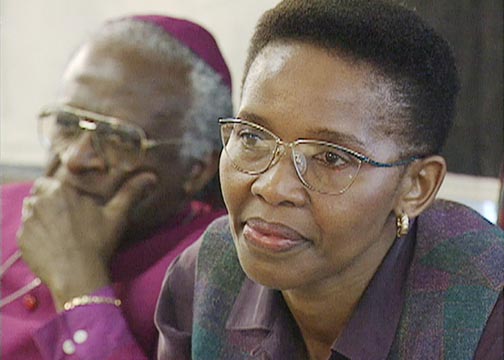Great Texts/Big Questions: Pumla Gobodo-Madikizela


Gobodo-Madikizela will present The Cry of Nomonde Calata: What is Missing in the Discourse of Reconciliation?
On the official opening of the public hearings of the TRC, the large city hall in East London was full to capacity – all black with the white TRC commissioners and some reporters the only visible white people in the audience. When the audience rose to sing a song that was at once a poem and an anthem of black pain, the song reverberated through the large hall, carrying the hope that the moment promised, the same moment into which Nomonde Calata screamed her own pain. The atrocities of apartheid – in Calata’s case, the murder of her husband and burning of his body by the security police – were denied by the apartheid government, and their social representation erased.
With Calata’s heart-wrenching scream at the opening of the TRC public hearings as backdrop, Gobodo-Madikizela explores the promise and limits of the TRC’s process of public testimony, and illustrates the power of the TRC to portray the human condition. Using a Kleinian psychoanalytic interpretive lens, she shows how the TRC expanded the possibility of psychological redress beyond the trauma of witnesses testifying on stage, opened the space for confronting guilt and denial, and created opportunities for change and transformation. Yet, there is no doubt that something has gone wrong with the reconciliation vision in South Africa. In the final section of her presentation, Gobodo-Madikizela explores this question of what is missing in the discourse of reconciliation.
Pumla Gobodo-Madikizela, an NRF B-rated researcher, is professor and Research Chair for Historical Trauma and Transformation in the Faculty of Arts and Social Sciences, Stellenbosch University. Her previous positions have included professor in the Psychology Department at the University of Cape Town, and Senior Research Professor for trauma, memory and forgiveness at the University of the Free State. Among her books, A Human Being Died that Night: A Story of Forgiveness, won the Alan Paton Award in South Africa, and the Christopher Award in the United States. It has been published six times, including translations in Dutch, German, Italian, and Korean.
The lecture, followed by an open question and answer session, will take place from 17:30 – 19:00 on Tuesday 14 March 2017 in Hiddingh Hall, UCT Hiddingh Campus, 31 – 37 Orange Street, Cape Town.
Refreshments will be served from 17:00. Please RSVP at ica@uct.ac.za
For more information, contact Sascha Polkey at Rabbit in a Hat Communications: sascha@rabbitinahat.co.za | 021 300 0052.
Listen to the podcast here.
About the ICA’s focus on the TRC:
From 14 March to 12 April the Great Texts/Big Questions lecture series focuses on the Truth and Reconciliation Commission – its vision, successes, failures and public perceptions then and now. UCT's Institutional Reconciliation and Transformation Commission (IRTC), which recently set up its steering committee, will look into the Shackville protests that occurred on UCT’s Upper Campus in February 2016, as well as make recommendations for addressing underlying issues of institutionalized racism and sexism; transformation; decolonisation and discrimination. It is intended that the analysis of South Africa's TRC in this series – offered by five different speakers from varied perspectives – will provide content for thinking about UCT’s IRTC.
